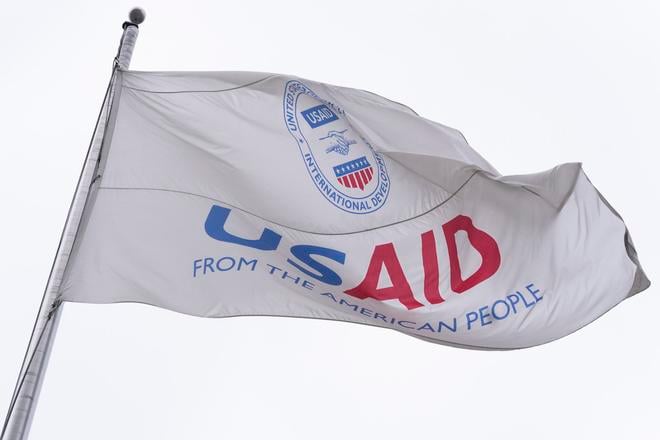Update: On February 11, 2025, we replaced the photo with the caption "Happier days. USAID Mission Director Paula Goddard (right) gives a award to a Slovak USAID trainee." with the current photo featuring a flag. The reason was the poor quality of the original photograph from the 1990s.
Clinical training of nurses and doctors in Košice hospital. A non-smoking prevention centre in Martin. Hospices and improved elderly care in Banská Bystrica.
All are projects of the American International Health Alliance, and all are programmes that will soon be significantly scaled back or ended completely this year as USAID, the United States Agency for International Development, dramatically winds down its Slovak mission in advance of its final closing date in September 2000.
The decision to pull the majority of USAID funding out of Slovakia has drawn criticism and sighs from Slovak non-governmental organisations and USAID subcontractors who say there is still much more work to be done in the country. But the head of the mission, Paula Goddard, said that the pull-out should also be seen as a sign of Slovakia's progress. Slovak NGOs, she said, are now sophisticated enough that they should be able to find new funding sources.
"I know that the decision (to leave Slovakia now) is controversial," she said in an interview at the mission headquarters in Bratislava. "Timing on ending any programme is a judgement call and a difficult judgement call... But our programme for Central and Eastern Europe was established years ago with a very short timetable. It was meant to assist countries in transition. While Slovakia has its needs... they have to be weighed against, pound for pound, where the assistance needs might be greater."
Predictions of how the USAID pull-out will affect the NGO sector range from disaster scenarios to limited troubles. While grants such as those administered by the Health Alliance will end, others will start with new seed money from growing funding sources such as the European Union's PHARE grant programme, which has pledged up to 100 million euros in assistance in 1999 alone. Some in the sector predict a few years of difficulty for those NGO sectors that have traditionally relied on American funding.
Primary among those is the pro-democracy sector, which attempts to make citizens more politically aware and government officials better trained. Projects in this sector run by the Slovak Foundation for a Civil Society (NOC), the International Republican Institute, and the National Democratic Institute for International Affairs, for example, are all shrinking dramatically or ending.
Environmental groups might also be affected, said Dušan Ondrušek, executive director of the Slovak NGO Partners for Democratic Change. On the other hand, he added, the vast majority of Slovak NGOs—which can be anything from church charity groups to sports teams—will not be touched.
"The pull-out will have diverse consequences for different organisations. It will weigh very heavily on democracy and environmental organisations, as they rely a lot on international funding: domestic sources are not interested in funding these things. (But) that is only about 100 or 200 of the total 13,000 non-profits registered," he said.
About 20 percent of NOC's current funding comes from USAID due to a $700,000 three-year democracy project grant. But the change, said Ingrid Baumannová, Deputy Project Manager for the Democracy Network Programme, is not just about money.
"It is a bigger deal from the philosophical perspective. USAID brings us links with American NGOs, links with American schools... From the development of a civil society perspective, we would like to see it stay, or another programme like USAID begin."
In some other sectors, needs are so great that any departure of money is frustrating. The health sector, for example, is in critical need, said Priya Chandra, Slovak Country Coordinator of the Health Alliance. Meanwhile, the government's current healthcare reform strategy is "proceeding piecemeal," she said.
"We had hoped we would work with this government a little longer. While there were many missed opportunities in past years, now we can finally have an impact," she said.
USAID has been involved in pro-democracy, government training, environmental and other projects in Slovakia since 1990. At its height in 1994, USAID poured more than $44 million into Slovakia for projects ranging from bank restructuring to entrepreneurial education. Over the past five years, funding has decreased steadily, to $8.9 million in 1998.
The decision to leave Slovakia in 1999 was made in 1996 or 1997 in Washington, Goddard said. Some groups, such as the National Democratic Institute, said that in the past few years they were already operating on extensions to funding.
To ease the transition for the non-governmental organisation sector, as its final act USAID is awarding a $2 million grant for democracy, public policy, and advocacy projects to be administered over the next three years by a local NGO. The winner of that contract will be announced this month. A few more projects, such as work on the completion of a simulator at the Mochovce power plant and advising on bank privatisation and restructuring, will also continue.
Goddard added that she believed the transition would be smooth for Slovakia's third sector. "I have great confidence that the NGOs here have a bright future," she said.


 The flag of the United States Agency for International Development, or USAID, flies in front of the USAID office in Washington, on February 3, 2025. (source: Manuel Balce Ceneta)
The flag of the United States Agency for International Development, or USAID, flies in front of the USAID office in Washington, on February 3, 2025. (source: Manuel Balce Ceneta)